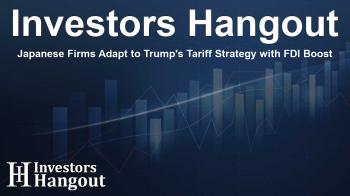Japanese Firms Adapt to Trump's Tariff Strategy with FDI Boost

Japanese Firms Adjusting to Tariff Policies
In recent years, Japan has seen a significant shift in its export strategies due to the tariff policies implemented by the Trump administration. These tariffs have prompted Japanese companies to bolster their production capabilities in the United States, shifting focus from their home country to local subsidiaries.
Decline in Exports and Rising Investments
Recent reports indicate that Japan's export volume to the U.S. has reached a four-year low. Despite this decline, the overall export figures remain robust, albeit fluctuating around averages. In response, Japanese corporations have ramped up foreign direct investment (FDI) into the U.S, indicating a strategic pivot towards domestic production.
Boost in U.S. Production
The second quarter of the year highlighted this trend dramatically, as subsidiaries of Japanese manufacturers in North America experienced sales growth exceeding that of overall exports from Japan by a notable margin. In a striking example, Toyota's U.S. output soared by an impressive 28.5% compared to the previous year, while its production back home faced a decrease of 5.5%.
Record High FDI Expectations
As Marcel Thieliant, head of Asia-Pacific at Capital Economics, pointed out, the foreign direct investment flowing from Japan to the U.S. is expected to hit record levels this year, potentially capturing an astounding 47% of Japan's total outbound FDI. The combination of favorable economic conditions in the U.S. and limitations posed by European markets seems to be driving this resurgence.
Trade Deals and Economic Implications
In July, a significant trade agreement between the U.S. and Japan was established, reducing tariffs from 25% to 15%. In return, Japan committed to investing $550 billion into pivotal U.S. industries. Yet, Wall Street remains skeptical about the realization of these ambitious investments amid the ongoing uncertainties surrounding Trump’s tariff policies.
Potential Impact on Global Trade Dynamics
This considerable shift in production by Japanese firms could reshape economic narratives not just domestically but globally. The agreement included sharing profits until investments are fully recouped, showcasing the intertwined futures of both economies. Such dynamics may drastically alter supply chains and influence market behaviors in unexpected ways.
Toyota's Resilience Amid Challenges
Amidst the backdrop of these evolving trade dynamics, Toyota has reported eight consecutive months of sales growth in the U.S., reflecting a 13.6% increase largely driven by the escalating demand for hybrid vehicles. This demonstrates how certain sectors can thrive despite the prevailing challenges posed by tariffs.
Labor Concerns Affecting Reshoring
However, challenges loom within the labor market. Ford's CEO, Jim Farley, has issued warnings about impending labor shortages in the U.S., highlighting staggering deficits in skilled workers across various sectors, including manufacturing. This raises concerns on how effectively companies can reshore production without a sufficient workforce.
Frequently Asked Questions
How have Japanese firms adapted to U.S. tariffs?
Japanese firms are increasing production in U.S. subsidiaries, responding to lower export volumes due to tariffs.
What is the expected level of FDI from Japan to the U.S.?
FDI from Japan to the U.S. is set to reach a record high, making up about 47% of Japan's total outbound investment this year.
What effects do tariffs have on Toyota's business?
Despite tariffs, Toyota has seen significant growth in U.S. sales, primarily due to rising demand for hybrid vehicles.
What are the labor market implications for U.S. production?
Labor shortages in the U.S. are concerning, with substantial deficits projected in skilled trades, potentially affecting reshoring efforts.
What are the broader impacts of the U.S.-Japan trade deal?
The trade deal could reshape global supply chains and impact economic relationships between the two countries significantly.
About The Author
Contact Kelly Martin privately here. Or send an email with ATTN: Kelly Martin as the subject to contact@investorshangout.com.
About Investors Hangout
Investors Hangout is a leading online stock forum for financial discussion and learning, offering a wide range of free tools and resources. It draws in traders of all levels, who exchange market knowledge, investigate trading tactics, and keep an eye on industry developments in real time. Featuring financial articles, stock message boards, quotes, charts, company profiles, and live news updates. Through cooperative learning and a wealth of informational resources, it helps users from novices creating their first portfolios to experts honing their techniques. Join Investors Hangout today: https://investorshangout.com/
The content of this article is based on factual, publicly available information and does not represent legal, financial, or investment advice. Investors Hangout does not offer financial advice, and the author is not a licensed financial advisor. Consult a qualified advisor before making any financial or investment decisions based on this article. This article should not be considered advice to purchase, sell, or hold any securities or other investments. If any of the material provided here is inaccurate, please contact us for corrections.

